- Home
- H A CULLEY
TREASONS, STRATAGEMS AND SPOILS: Kings of Northumbria Book 6 Page 3
TREASONS, STRATAGEMS AND SPOILS: Kings of Northumbria Book 6 Read online
Page 3
‘Eochaid, is there anything you can add which might help us? I know the circumstances were different, but...’
My father’s voice trailed away as Eochaid got to his feet.
‘Yes, we rode double with an archer behind each horseman clinging on for dear life.’
This was greeted by laughter but then everyone realised what a good idea it was. We could muster perhaps a hundred and fifty mounted men between the three shires, but the same number of archers could turn Gedwearde into a real stronghold.
~~~
It was a close run thing. Our men were still removing the stones from the ford when the enemy scouts appeared. Our archers killed a couple of them before the rest turned tail and fled, but it wouldn’t be long before their main body arrived. Thankfully, it was less than two hours before sunset. They might try a quick assault before dark but the real test would come at dawn – or so we thought.
Nothing happened and we went to sleep wondering why we had been granted a reprieve. At the end of the night I spent two hours on guard, patrolling the parapet that ran around the palisade, but I neither heard nor saw anything. Everyone else was up and in position as a watery sun rose behind some thin clouds; still nothing happened. An hour later the three ealdormen met to confer.
‘Right, we don’t know why they haven’t attacked us but we need to find out what’s going on. Ealdorman Æthelwold is going to take a small party over the Teviot on the ferry near where it joins the Twaid. He will then ride back westwards to discover the enemy’s whereabouts. As the enemy will be on this side they should be safe, but there’s always the possibility that they have scouts across the Teviot.’
‘Those who know the area have said that the ferry can only take two horses and their riders at a time so I’m only going to take three men with me. Volunteers?’
I was the first on my feet and, although my father glared at me, he could hardly forbid me to go. Uurad was one of the other two chosen, presumably to keep me out of trouble, together with one of Æthelwold’s gesith - a man called Cynric.
It was a warm day for late spring as we covered the eight miles to the ferry in under an hour. The double trip across the river took an hour all told and then we were on our way again. As we neared Gedwearde across the river I half expected to see it under attack, but nothing had changed since we left. Then, ten minutes later we found out why.
I was riding point with Æthelwold and Cynric fifty yards behind me and Uurad bringing up the rear when we discovered where Eardwine’s army was. Thankfully I heard them before we ran into each other. A horse neighed and I heard voices; both sounds were faint and so I judged that they were a little way ahead of me. I turned around and made my way quietly back to the others.
‘It could just be a party of scouts,’ Æthelwold said thoughtfully, ‘but if the main body have managed to cross to this side of the river it would explain why they didn’t attack Gedwearde. We need to find out. For now we need to get into the trees and let them pass us.’
Two minutes later half a dozen men on ponies road past us. We didn’t have to worry about them spotting us; they were chatting amongst themselves in a language I didn’t understand.
‘Irish,’ Uurad whispered.
We waited and a few minutes later another party of horsemen rode past us, this time they were better armed and mounted on horses, not ponies. I heard one of them address the man riding at the head of the small column as Cyning so it had to be Eardwine and his gesith. Behind them came warriors on foot. Those in the lead were wearing helmets and byrnies and carried shields, spears and swords, but the great mass following them wore just tunic and trousers,nor and were poorly armed.
Behind the long line of baggage carts came a smaller group who looked like fierce fighters but, again, few wore anything to protect their bodies; indeed many were half naked.
After they had gone we conferred and came to the conclusion that those on foot ahead of the wagons were Britons from Strathclyde and those at the rear were Irish kerns. In all there were about two thousand of them. It was less than Eadbehrt had mustered but battles didn’t always depend on raw numbers. The men we saw looked like fierce warriors in the main, whereas our fyrd hadn’t been called upon to fight for decades.
Now we had the problem of warning my father and the rest that our foes were on the north bank.
‘Where will they cross back again, lord?’ Cynric asked Æthelwold.
‘They’ve got two options now,’ he replied grimly. ‘If they do so they’ll be heading for Bebbanburg but, if they cross the Twaid where it meets the Teviot they’ll be making for Berwic.’
Neither was good news for us because it meant that they would either be pillaging Æthelwold Moll’s shire or my fathers’. Somehow we had to delay them.
~~~
When we reached the point on the north bank opposite Gedwearde again we waved frantically to attract the attention of the sentries but we needn’t have bothered. They had evidently seen the enemy host going past and Eochaid and Ulric were already preparing to leave and head east.
When we got back to the ferry the two men who operated it had vanished. Fortunately the ferry itself was on our side of the river so we rowed it across ourselves. It was overloaded with the two extra horses but we made it safely and left it on the south bank. Instead of waiting for the rest of our men, Æthelwold decided to press on with Cynric and shadow the enemy from this side of the Teviot. Uurad and I were sent back to tell the rest what he was doing and the conclusion he’d come to about the two alternative routes they could take.
‘There is a bridge over the Teviot just south of where it meets the Twaid. I believe they’ll cross there and head for Bebbanburg. If they can take the fortress quickly, Eardwine will be in a strong position. If he has to lay siege to it he risks being trapped between it and the rest of Eadbehrt’s army,’ Eochaid said dispassionately, trying to forget that our family was inside.
I couldn’t help thinking that Renweard might have been safer with us after all. The threat to our family obviously worried father, though he hid it well and tried to concentrate all his attention on the task in hand.
‘We need to get to the bridge first,’ he said, looking at Eochaid for confirmation. ‘Even with our few numbers we should be able to prevent them crossing.’
‘I agree, let’s get moving.’
The bridge was a simple timber affair which was just wide enough for a cart to cross one way at a time. That meant it could take perhaps three horsemen riding abreast or five men on foot. Those using the bridge had to pay a toll and the man who collected the payments lived in a hovel on the far side.
He was less than happy to be told we needed his hut but, when he heard about the pillaging horde coming towards us, he and his family loaded their possessions onto a small cart and disappeared into the hinterland, driving their few head of livestock before them, before we’d even finished dismantling his former home. We used the timbers and the wattle panels of which it was made to barricade the south end of the bridge and to make breastworks along the bank to protect the archers.
We didn’t have long to wait after we’d finished our preparations. The priest with us was half way through celebrating mass when the scouts appeared. He hastily blessed everyone and we ran to our places.
The scouts debated amongst themselves for a few minutes then half turned tail and went back the way they’d come whilst the rest continued along the far bank. They sauntered past our position, calling out insults we didn’t understand, until a few archers decided they’d had enough and sent half a dozen arrows their way.
Two of the six toppled to the ground wounded whilst a pony, struck in its rump by an arrow, bolted and unseated its rider. When he got to his feet two arrows struck his chest and he fell to the ground. The other three galloped out of range and then slowed to a canter.
‘Seofon, take half a dozen men with you and shadow them. I’m fairly sure there is nowhere they can cross, but make sure.’
I thanked Eochaid f
or picking me and, nodding a farewell to my father, I went to find six of the warband who had trained with me. A few minutes later we were on our way, galloping until we saw the other riders again. They were studying the confluence of the Teviot and the Twaid. The weather had been fine for the last few days but the rain we had endured before that took time to come down from the hills to swell the rivers. Consequently the water was still quite deep and flowing fast; however, the level would be dropping all the time from now on.
The three scouts ignored us and eventually turned and headed upriver, following the Twaid. They were now heading back westwards.
‘They won’t find anywhere to cross the Twaid before they come to the junction with another river coming in from the west,’ Edgar told us.
As he was the son of the local thegn he knew this part of the Twaid and the country around it well.
‘Am I right in thinking that, if we can stop them crossing the Teviot for long enough, the king can bottle them up in this triangle of land between the Teviot and the Twaid?’
Edgar shrugged. ‘I suppose so, but we don’t know where the rest of our army is.’
‘Wherever they are, they’ll be on the wrong bank of the Teviot,’ another said.
‘Not if we let them know the situation,’ I pointed out excitedly. ‘They can cross to the north bank of the Teviot where the Britons and the Irish did.’
‘Come on, what are we waiting for? Let’s go back and tell your father.’
~~~
We weren’t the only ones to have archers. Some of the Irish and two hundred or so of the Strathclyde Britons had bows. For the first hour or so their attempt to capture the bridge was devoted to a war of attrition between our bowmen and theirs. Our archers were mainly members of the fyrd who owned the short bows used for hunting but they also had a few dozen men equipped with longer bows made from yew that had more range and greater ability to pierce chain mail.
Luckily our men had the protection of the wattle and daub panels taken from the toll collector’s hut. After they had lost a few archers the enemy quickly provided each one the protection of a man with a shield. Whereas our shields were large and circular, theirs varied from the small circular type, called a targe, to the old-fashioned oblong Celtic shields like a fat figure eight which had been used by Britons since the time of the Romans.
Of course, the targes were of little use in protecting both holder and archer but the oblong shields gave their archers nearly as much protection as our breastworks. All the same, we managed to kill a few of their men but we lost a dozen or so too. It soon became apparent that they were intent on making us use up our arrows to no good purpose.
‘Stop wasting arrows and retrieve as many of theirs as you can, provided you can do so safely,’ Eochaid shouted. ‘Wait for them to rush the bridge.’
We didn’t have to wait for long. As soon as they realised that we were conserving our supply of arrows they surged across the bridge. The skilled warriors in chain mail were meant to lead but two score or so youths who weren’t weighed down with byrnie and helmet overtook them and reached the bridge first.
For our archers it was like aiming at the side of an ealdorman’s hall. They couldn’t miss the tightly packed mass of bodies running across it. Those in front and on the outside were hit first but, as they fell wounded or dead, the men who had been in the middle started to take casualties. By the time the armoured warriors started to cross, the narrow bridge was full of the dead and the dying.
They were forced to pick their way over the obstacles and the momentum of their charge was broken. Several of them were also incapacitated by our archers. Chain mail may have protected their torsos in most cases, but not their legs or arms.
I was in the second row of defenders. The man in front of me stood hard up against the barricade with just his helmeted head exposed above his shield. He held his spear pointing downwards at the attackers’ legs, whilst I rested my spear on his shoulder, aiming at their necks and faces.
Suddenly we were faced by men yelling and trying to kill us. A spear glanced off the helmet of the man in front of me and I had to move my head to one side to avoid the point. I was so petrified that I forgot to thrust back at his face but luckily someone else wounded him and he dropped out of sight with a cry.
He was immediately replaced by two men standing shoulder to shoulder with only their eyes showing between the rim of the helmets and the tops of the shields. I took careful aim and thrust my spear point into the eye of the man on the left. The man in front of me wounded another in the thigh at the same time. However, it gave another Irish mercenary the opportunity he needed. Whilst my companion was still extracting his spear he fell backwards into me with a sword in his mouth.
This had all come as something of a shock to me. Oh, I’d trained for two years but nothing prepares you for your first battle – the horror of it, the blood, the smell of piss and shit, and the noise. For a moment I was stunned but then I reacted, almost without thinking, and pulled my spear out of the dead man, stepped forward and raised my shield over my face to take the next blow by my opponent’s sword.
We were too close for me to use my spear so I thrust it sideways into the neck of the mercenary attacking the man to my right and let go of it. I felt another hammer blow to my shield as I struggled to draw my sword in the confined space. Realising I didn’t have enough room, I drew my seax instead and, lowering my shield, I thrust it into the surprised face of my adversary. The point hit the nasal bar of his helmet and was deflected into his cheek, which was sliced open as far as his ear. He yelled, as much in anger as in pain, and slashed at my head. I was slow in getting my shield up and I took the blow on my helmet.
The next thing I knew I was lying on the ground with a splitting headache and a raging thirst. At first I could recall nothing and then it all came flooding back to me like a wave crashing on the shore. I groaned and tried to lift my head but I seemed to have lost control of my body.
I felt someone lifting my throbbing head and pressing a drinking horn to my lips. I greedily tried to slurp the water it contained but my companion pulled it away before I’d taken no more than a couple of mouthfuls.
‘Easy now, lord. Take it slowly or you’ll be sick.’
I realised that the speaker was Seward – a Mercian boy who my father had given me as my body servant when I first became a warrior. He was reticent about his background but the rumour was that his parents had been very poor and had eight young children to feed, so they had sold Seward – the youngest boy – into slavery. He’d been seven at the time and had been a cook’s boy up until the time that he was given to me at the age of twelve.
‘What happened?’ I asked trying to lift my head to look around me and failing.
I fell back and realised that Seward had my head cradled in his lap. I hadn’t paid much attention to him up until now; our contact being confined to my giving him orders. However, I’d never beaten him for failing to understand what was required straight away or for not getting all the rust off my byrnie. I’d patiently explained where he’d gone wrong and I never had to tell him twice, so I suppose I was a kind master compared to many.
‘You were knocked out and were passed back out of the line of defenders. I and another servant managed to get you loaded across your horse and I led you back to the baggage train. I went and fetched one of the monks who was tending the wounded and he bathed your wound and checked for damage before putting a bandage on it.’
I felt my face and realised that a strip of cloth had been wound over my head and under my chin to hold a wad of linen in place just above my ear.
‘He said the blow had cut into your scalp but hadn’t damaged the skull itself.’
Seward held my helmet up so I could see where the blade of his sword had dented and torn the metal. However, it had evidently taken most of the force out of the blow and the leather cap I wore under it must have helped too.
‘He said he couldn’t stitch a head wound but thought that you shou
ld be as right as rain in a few weeks. The hair might not grow back over the scar though.’
He said this as if he was fearful that I would blame him for it. I smiled and was about to reassure him when I suddenly felt extremely ill and vomited all over his right knee.
He didn’t say anything but just wiped my face with a wet cloth before scrubbing the worst of it off his coarse woollen trousers.
‘Sorry,’ I mumbled.
His face registered surprise. Masters didn’t apologise to slaves. He laughed.
‘It’s not the first time you’ve chucked up over me. I’ll go for a swim in the river when this is all over.’
It was one of the things I’d noticed about him. Most slaves stank but he never did; well, not before today. Furthermore, he could swim; a skill few possessed. It crossed my mind that Seward was something of an enigma. Even his name, which meant guardian of the coast, was not something that a poor villein, or even a ceorl, would normally christen his son.
Later on I found out that his father had been a thegn but raiders had destroyed his vill and robbed him of nearly everything he’d possessed. He’d complained to his ealdorman but, as the raiders were led by his lord’s cousin, nothing was done about it and he was reduced to the status of a ceorl, and a poor one at that. One of the features of our society was that a ceorl who amassed enough land to qualify as a vill could become a thegn, but movement down the social scale was possible as well.
‘What’s happening?’ I asked, bringing my mind back to the battle.
‘Oh, the enemy withdrew shortly after you got knocked out. Then they tried to wade across the river further down but several got washed away and our archers and spearmen stopped them climbing up the slippery mud onto the top of the bank. We lost a score of men but they must have lost ten times that.’

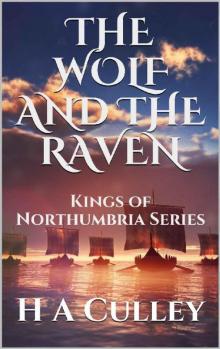 The Wolf and the Raven
The Wolf and the Raven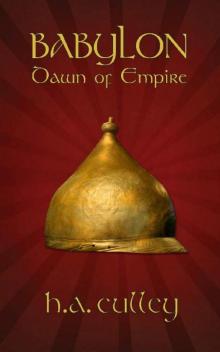 Dawn of Empire
Dawn of Empire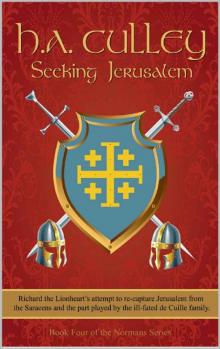 Seeking Jerusalem
Seeking Jerusalem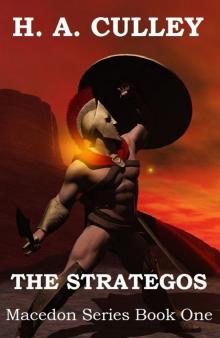 The Strategos
The Strategos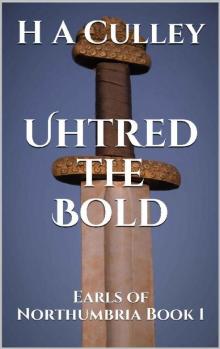 Uhtred the Bold
Uhtred the Bold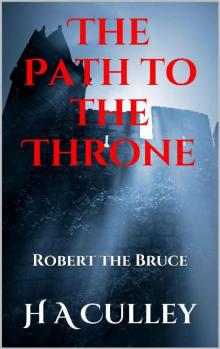 The Path to the Throne
The Path to the Throne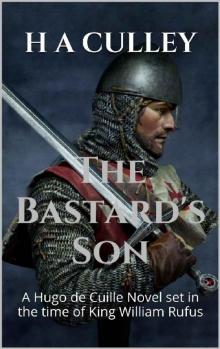 The Bastard's Son
The Bastard's Son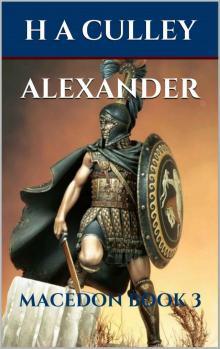 Alexander
Alexander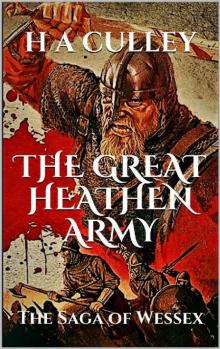 The Great Heathen Army
The Great Heathen Army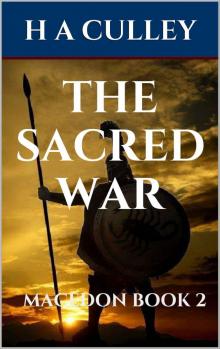 The Sacred War
The Sacred War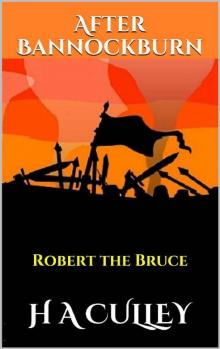 After Bannockburn
After Bannockburn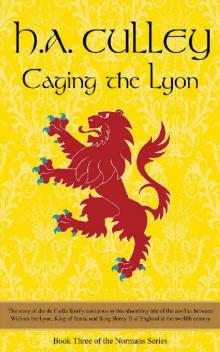 Caging the Lyon
Caging the Lyon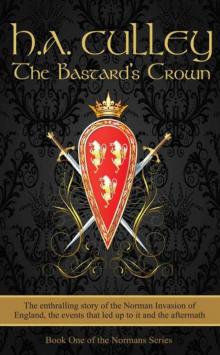 The Bastard's Crown
The Bastard's Crown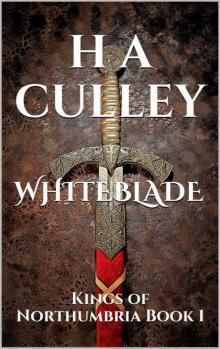 WHITEBLADE
WHITEBLADE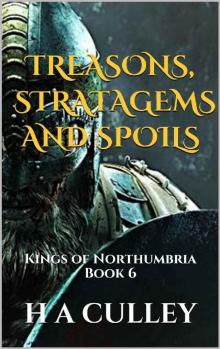 TREASONS, STRATAGEMS AND SPOILS: Kings of Northumbria Book 6
TREASONS, STRATAGEMS AND SPOILS: Kings of Northumbria Book 6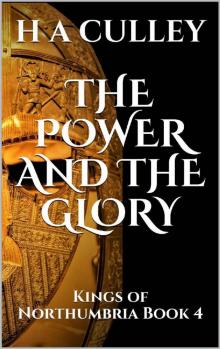 THE POWER AND THE GLORY: Kings of Northumbria Book 4
THE POWER AND THE GLORY: Kings of Northumbria Book 4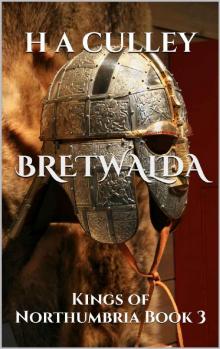 BRETWALDA: Kings of Northumbria Book 3
BRETWALDA: Kings of Northumbria Book 3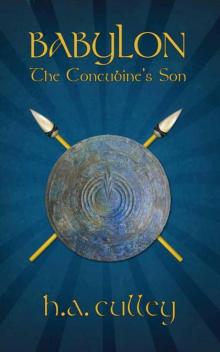 The Concubine's Son
The Concubine's Son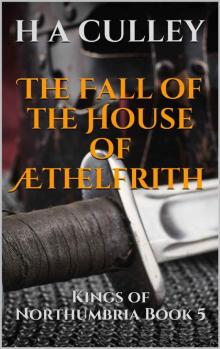 The Fall of the House of Æthelfrith: Kings of Northumbria Book 5
The Fall of the House of Æthelfrith: Kings of Northumbria Book 5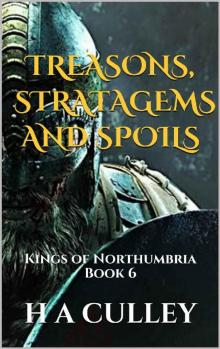 TREASONS, STRATAGEMS AND SPOILS
TREASONS, STRATAGEMS AND SPOILS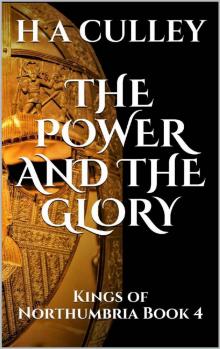 THE POWER AND THE GLORY
THE POWER AND THE GLORY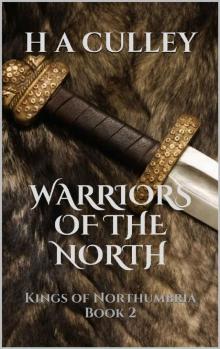 WARRIORS OF THE NORTH
WARRIORS OF THE NORTH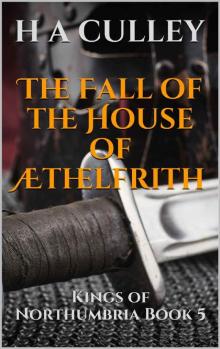 The Fall of the House of Æthelfrith
The Fall of the House of Æthelfrith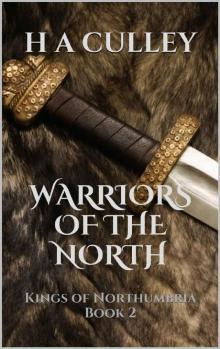 WARRIORS OF THE NORTH: Kings of Northumbria Book 2
WARRIORS OF THE NORTH: Kings of Northumbria Book 2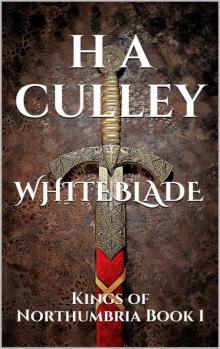 WHITEBLADE: Kings of Northumbria Book 1
WHITEBLADE: Kings of Northumbria Book 1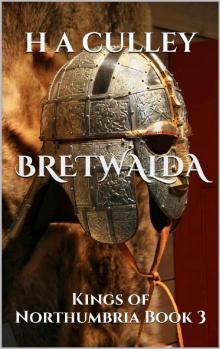 BRETWALDA
BRETWALDA